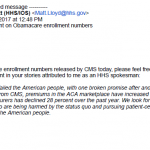Affordable Care Act
Last year’s emergency Zika funding is about to run out and there’s no new money in the pipeline. It’s emblematic of the kind of short-term, reactive policymaking that public health officials have been warning us about for years. Now, as we head into summer, public health again faces a dangerous, highly complex threat along with an enormous funding gap.
“The Zika threat will get worse,” said Claude Jacob, chief public health officer at the Cambridge Public Health Department in Massachusetts and president of the National Association of County & City Health Officials (NACCHO). “And the…
When you ask public health advocates about President Trump’s recent budget proposal, you typically get a bewildered pause. Public health people don’t like to exaggerate — they follow the science, they stay calm, they face off against dangerous threats on a regular basis. Exaggerating doesn’t help contain diseases, it only makes it harder. So it’s concerning when you hear words like this about Trump’s budget: “devastating,” “not serious,” “ludicrous,” “unfathomable.”
Released in late May, Trump’s fiscal year 2018 federal budget proposal calls for cutting the budget at the Centers for Disease…
In early May, House Republicans rushed to pass an amended version of the American Health Care Act (HR 1628) without waiting for the Congressional Budget Office to give them an estimate of how it would affect health insurance coverage nationwide. Now, CBO has released a score that shows just how destructive this legislation will be if it becomes law: It will increase the number of uninsured by 23 million over the next decade by slashing Medicaid, allowing the destabilization of the individual markets in areas where one-sixth of the US population resides, and putting individual policies out of…
To the surprise of literally no one, President Trump’s 2018 budget proposed stripping all federal funds, including Medicaid dollars, from Planned Parenthood. Proponents of this argue that if Planned Parenthood clinics end up shuttered, women can simply access care elsewhere. But growing research shows that’s the opposite of what actually happens.
We got even more evidence of this with a report on the capacity of federally qualified health centers (FQHCs) to fill the gaps left when a Planned Parenthood clinic is forced to close its doors. In a policy paper from the Guttmacher Institute…
Last week, 217 Republican members of the House of Representatives passed a bill that, if it becomes law, will leave millions of people without health insurance. We don’t have a good grasp of how many millions will be harmed, because they were in too much of a hurry to wait for an estimate from the nonpartisan Congressional Budget Office — or, in some cases, to read the bill they were voting on. My guess is that most of those members know it’s a terrible bill that will harm many of their constituents, and they’re hoping the Senate will fix the mess they’ve made.
Like the original American…
Back in March, House Republicans pulled the unpopular and highly problematic American Health Care Act from consideration, and House Minority Leader Paul Ryan declared “Obamacare is the law of the land.” Now, however House Republicans are trying again to undo the Affordable Care Act. Last week, Representative Tom MacArthur (R-NJ) introduced an amendment designed to win over the hard-line House Freedom Caucus, who opposed the original AHCA because it didn’t do enough to roll back existing law.
As the New York Times’ Margot Sanger-Katz summarizes, the amendment would allow states to receive…
More than 8 million U.S. children depend on the Children’s Health Insurance Program for access to timely medical care. The program is authorized through 2019, but its federal funding expires in September and it’s unclear what Congress will do.
That uncertainty stresses all the systems and families that depend on CHIP, but it may be especially risky for the 2 million chronically ill children who get care through the program, which was originally designed for families falling in the gap between market affordability and Medicaid eligibility. In a study published this month in Health Affairs,…
There was always an assumption that the Affordable Care Act would need time to find its sea legs. That’s why it included measures to shield insurers from the potential profit losses that inherently come with offering millions more people better health coverage at more reasonable prices. Insurers operate on profit margins and the ACA took that into account, for better or for worse.
But it’s still been a rocky road for insurers. (Insert argument here for single-payer health care, but that’s a different story.) On the patient side, with 20 million more Americans insured and growing accounts of…
Public health is in trouble.
Last month, President Trump released his proposed budget for fiscal year 2018. It was more of an outline, really, and didn’t provide many details, but it did call for a nearly 18 percent cut to the U.S. Department of Health and Human Services and for block granting the budget at the Centers for Disease Control and Prevention. At the same time, the White House supports repealing the Affordable Care Act. That repeal would also eliminate the Prevention and Public Health Fund, which now accounts for about 12 percent of CDC’s budget and funds critical public…
In the 18 days between House Republicans’ introduction of the American Health Care Act and its withdrawal, women’s health was in the spotlight. With House Speaker Paul Ryan now stating that he’s going to try again on legislation to “replace” the Affordable Care Act, it’s worth looking at some of the ways the ACA has benefited women – and how actions from Congress and the Trump administration could affect women’s insurance coverage and access to care.
Women gained coverage under the ACA
The ACA’s biggest achievement was reducing the percentage of the population without health insurance. It did…
Many of us breathed sighs of relief on Friday when House Speaker Paul Ryan announced the withdrawal of legislation to roll back the Affordable Care Act. The bill, the American Health Care Act, would have resulted in 24 million people losing insurance and $880 billion less for Medicaid over the next 10 years -- while giving an $883 billion tax cut targeted to the wealthiest. At town hall meetings and over the phones, members of Congress heard from constituents urging them to leave the ACA’s coverage expansions in place. Yet the bill’s defeat doesn’t mean that the idea of…
Yesterday, House Republicans failed to find enough votes to pass their Affordable Care Act replacement. It was a very good day for the millions of Americans projected to lose their coverage under the GOP plan. But let’s be clear: Obamacare is not safe.
In a last-ditch effort to round up more votes, House Speaker Paul Ryan, R-Wis., proposed an amendment that would have, beginning in 2018, allowed states to determine the kinds of essential health benefits required in insurance plans purchased with tax credits. Under Obama’s health care law, insurance plans sold via the federal health care…
There’s a lot at stake for women’s health in the Republican plan to replace the Affordable Care Act, which eliminated out-of-pocket costs for birth control and has been highly successful in breaking down barriers to affordable family planning. The cost-sharing changes alone are saving individual women hundreds of dollars each year on their choice of contraception.
So far, the Republican replacement proposal, known as the American Health Care Act, doesn’t impact the Obama-era contraception coverage provisions, nor does it touch other women’s health benefits, such as designating maternity care…
As the Republicans push forward their abysmal Affordable Care Act replacement, much of the talk surrounding its impact focuses on insurance numbers and premium hikes. Those things are certainly important. But this is more important: The Republican plan will cause unnecessary suffering and preventable death.
How do we know this? Let’s start with the Congressional Budget Office report that scored the Republican replacement plan, titled the American Health Care Act. That report estimates that if the Republican plan is enacted, 14 million more people would be uninsured by 2018 than would…
House Republicans have released –and rushed through two committees—the American Health Care Act, which would result in destabilized individual insurance markets and millions of people losing health insurance. The Congressional Budget Office hasn’t yet released its estimate of the likely impacts, but an analysis from authors at the Brookings/USC Schaeffer Initiative calculates it would result in 15 million people losing coverage. The AHCA contains provisions addressing both private and public insurance; I’m most concerned about the impacts on Medicaid, which would shift substantial healthcare…
A policy brief about Congressional Republicans’ bill to replace the Affordable Care Act has two Medicaid provisions that could prove seriously detrimental to public health and states’ finances: Gutting the ACA’s Medicaid expansion, and changing the current Medicaid financing structure. A Center on Budget and Policy Priority analysis of these two changes calculates that they would shift hundreds of billions in costs from the federal government to the states over the next 10 years. I’ll explain what these two policies are, but first I want to highlight a few things about the Medicaid program.
(…
Today, The Pump Handle had its own bizarre experience with the Trump Administration. It came via an email sent by HHS spokesperson Matt Lloyd to members of the Association for Health Care Journalists. Some of those professionals were reporting on the data released today by the Centers for Medicare & Medicaid Services (CMS) on insurance enrollment on Healthcare.gov. The 90-day open enrollment period ended this week.
CMS's plain-spoken news release indicates that 9.2 million individuals selected plans from the ACA marketplace, including three million new consumers. Many of these Americans…
We’re just a humble little public health blog. But we can still do our part. If you or someone you know need help getting health insurance coverage before next week’s enrollment deadline on Jan. 31, here are some good resources.
First, why do this? Because this week, the Trump administration abruptly canceled advertising and outreach scheduled to run during this final week of Affordable Care Act enrollment. Apparently, he even pulled ads that were already paid for. But, you can still enroll. According to Paul Demko at Politico:
(The Trump administration) is also halting all media outreach…
As Congressional Republicans continue taking steps toward repealing the Affordable Care Act without providing a detailed, workable plan to replace it, more people are speaking out against ACA repeal.
GOP Governors John Kasich of Ohio and Rick Snyder of Michigan are speaking to journalists about how the ACA’s Medicaid expansion has helped their states. Governor Snyder explained to The Detroit News that the state accepted the Medicaid expansion but added requirements for recipients earning between 100% and 133% of the federal poverty level, and that the program is working and has the potential…
Republicans in Congress are pressing forward with a plan to repeal the Affordable Care Act through a budget reconciliation process, which requires only 50 votes but can only eliminate the portions of the law that affect the federal budget. They don’t yet have a viable plan to replace it, so they’re pushing a “repeal and delay” strategy that would involve repealing the law now and asking voters to trust them that they’ll come up with something else in a few years (on top of the six they’ve already had). That something else would almost certainly involve skimpier coverage or the loss of…

